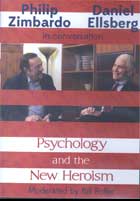
Psychology and the New Heroism 2012
Distributed by Bullfrog Films, PO Box 149, Oley, PA 19547; 800-543-FROG (3764)
Produced by Julie Soller
Directed by Bill Roller
DVD, color, 87 min.
High School - General Adult
Social Psychology, Ethics, Civil Disobedience, Political Science
Date Entered: 05/13/2015
Reviewed by Timothy W. Kneeland, History and Political Science Department, Nazareth College of Rochester, Rochester, NYThis is a compelling discussion on what motivates individuals to conform to situations which violate their own moral code and what motivates those who rise above social structures to oppose social evils. Moderated by psychologist Bill Roller, an expert on group dynamics, the key participants are Daniel Ellsberg, the noted anti-war activist who released the Pentagon Papers in 1971, and Philip Zimbardo, the psychologist whose prison experiment demonstrated how roles can shape our tendency toward dehumanization and authoritarianism. The conversation addresses atrocities and human rights violations in social psychology experiments ranging from Milligram studies of the 1960s to the abuses of the Iraq War, with reflections on Zimbardo’s prison study and the My Lai Massacre, with a focus on what makes “heroes.” Heroes are defined by Zimbardo as someone who takes action on behalf or others or to support a moral principal knowing that they may face reprisal or punishment for their actions with no tangible reward awaiting them should they succeed. Using this definition, Zimbardo calls Ellsberg the “quintessential hero” because the activist might have been jailed for a hundred years for revealing classified documents on the Vietnam War.
The production values of this video are low. It is a one camera shot of the participants sitting in what appears to be a study or office. There is an off screen audience present but unseen. Equal time is not given to the cogent psychological insights of Zimbardo, who has half as much screen time as the voluble Ellsberg. At 87 minutes, the film seems overlong. It could not be shown in one class setting and even if it were possible, the intended audience would have a hard time focusing for the nearly hour and a half film. A more tightly edited version running about 40 minutes with a stronger focus on the psychological question posed at the outset of the video would have enhanced this production. Recommended for high school through adult audiences.